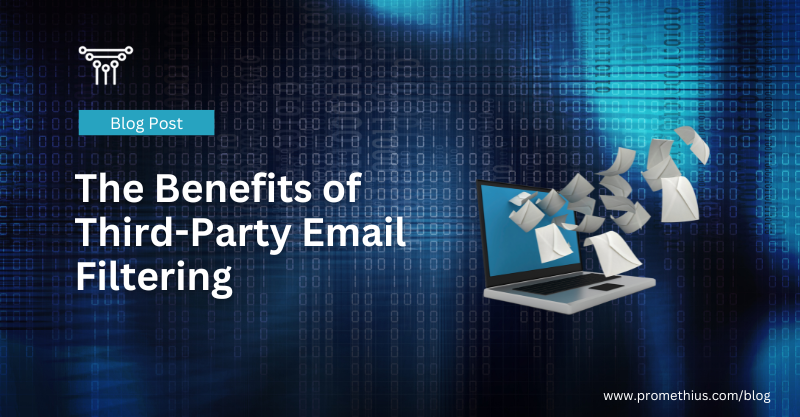- in Security by Denver Abernathy
The Benefits of Third-Party Email Filtering

Enhancing Security and Efficiency in the Digital Age
In the modern era of digital communication, email remains the backbone of business correspondence. However, with the increased use of email, there has been a corresponding rise in threats such as spam, phishing, and malware. To combat these challenges, many organizations are turning to third-party email filtering services. These services offer a multitude of benefits that enhance the security, efficiency, and reliability of email communication.
More...
Enhanced Security
One of the primary advantages of third-party email filtering is the enhanced security it provides. By leveraging advanced technologies and algorithms, these services can detect and block malicious emails before they reach the recipient's inbox. This proactive approach significantly reduces the risk of phishing attacks, malware infections, and other cyber threats.
Advanced Threat Detection
Third-party email filtering services use sophisticated threat detection mechanisms, including machine learning and artificial intelligence, to identify and mitigate potential threats. These technologies analyze email content, sender reputation, and attachment behavior to detect anomalies and potential risks. As a result, organizations can stay ahead of cybercriminals who continuously evolve their tactics.
Real-Time Monitoring and Updates
To maintain high levels of security, third-party email filtering services continuously monitor email traffic in real-time. This vigilance allows them to quickly identify and respond to emerging threats. Additionally, these services frequently update their threat databases and filtering rules, ensuring that they can effectively counteract the latest attack vectors.
Improved Productivity
Beyond security, third-party email filtering also contributes to improved productivity within an organization. By reducing the volume of spam and unwanted emails, employees can focus on their core tasks without the distraction of sifting through cluttered inboxes.
Reduced Spam
Spam emails are a pervasive issue that can overwhelm employees and impede their productivity. Third-party email filtering services employ robust spam detection algorithms that can accurately distinguish between legitimate and spam emails. This filtration process ensures that only relevant and important emails reach the inbox, allowing employees to work more efficiently.

Time Savings
With fewer spam and malicious emails to deal with, employees save valuable time that would otherwise be spent on identifying and deleting unwanted messages. This time savings translates into increased efficiency and productivity, as employees can dedicate more time to meaningful work.
Cost Savings
Implementing third-party email filtering can lead to significant cost savings for organizations. By preventing security breaches and reducing the workload on IT resources, these services offer a cost-effective solution for managing email security.
Reduced IT Overhead
Managing email security in-house can be resource-intensive and costly. Third-party email filtering services relieve IT departments of this burden by handling all aspects of email threat detection and mitigation. This outsourcing allows IT staff to focus on other critical tasks, leading to better resource allocation and cost savings.
Prevention of Data Breaches
Data breaches can have severe financial and reputational consequences for organizations. By preventing phishing attacks and malware infections, third-party email filtering services help safeguard sensitive information and protect against costly data breaches. This proactive approach to security minimizes the risk of financial loss and damage to the organization's reputation.
Scalability and Flexibility
Third-party email filtering services offer scalability and flexibility that can accommodate the evolving needs of organizations. Whether a company is a small business or a large enterprise, these services can be tailored to meet specific requirements and scale with growth.
Customizable Filtering Rules
Organizations have unique email security needs based on their industry, size, and risk profile. Third-party email filtering services allow for the customization of filtering rules to address these specific requirements. This flexibility ensures that the email security strategy aligns with the organization's objectives and risk tolerance.
Easy Integration
Third-party email filtering services are designed to seamlessly integrate with existing email infrastructure, whether it is on-premises or cloud-based. This ease of integration simplifies the deployment process and ensures that organizations can quickly benefit from enhanced email security without significant disruption to their operations.
Compliance and Reporting
Maintaining compliance with industry regulations and standards is a critical concern for many organizations. Third-party email filtering services provide comprehensive reporting and auditing capabilities that help organizations meet their compliance obligations.
Detailed Reporting
These services generate detailed reports on email traffic, threat detection, and filtering performance. These reports provide valuable insights into the organization's email security posture and help identify areas for improvement. Additionally, they can be used to demonstrate compliance with regulatory requirements.
Audit Trails
In the event of a security incident, audit trails provided by third-party email filtering services can be invaluable. These records allow organizations to investigate and understand the nature of the incident, identify the root cause, and take corrective actions. This capability is essential for maintaining compliance and improving overall security resilience.
Conclusion
In conclusion, third-party email filtering offers a wealth of benefits that enhance the security, productivity, and cost-efficiency of email communication. By leveraging advanced threat detection technologies, reducing spam, and providing scalability and compliance capabilities, these services are an essential component of a robust email security strategy. As cyber threats continue to evolve, organizations that adopt third-party email filtering will be better equipped to protect their email infrastructure and ensure the smooth operation of their business.
